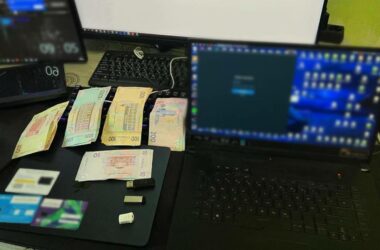A university professor has been arrested in Estonia on suspicion of facilitating and conducting intelligence activity targeting the country.
Viacheslav Morozov, 51, was a professor of international theory at the University of Tartu before the arrest led to his employment being terminated, according to Kristiina Tõnisson, the head of the university’s political studies institute.
The country’s Internal Security Service (Kaitsepolitseiamet or KAPO) announced on Tuesday that Morozov had been arrested two weeks prior, on January 3, to prevent him evading criminal proceedings or continuing to commit offenses.
Morozov is suspected of sharing information with Russian intelligence handlers during regular trips to Russia over the course of several years, as KAPO’s director general Margo Palloson told Estonia’s public broadcaster, ERR.
“The aggressor’s intelligence interest in Estonia remains considerable,” said Palloson.
Estonia, which was occupied by the USSR following World War II, shares a border with Russia and approximately a quarter of its 1.3 million inhabitants are ethnic Russians.
Back in 2007, just a few years after joining NATO, Estonia was impacted by a wave of cyberattacks when it relocated a Soviet war memorial from the center of the capital Tallinn to a military cemetery a few kilometers away. Officials blamed Russia for the incidents.
The digital attempts to hobble the country were groundbreaking and prompted a major research effort into cyberwarfare at NATO, eventually leading to the NATO Cooperative Cyber Defence Center of Excellence being founded in Estonia’s capital Tallinn in 2008.
Read more: Estonian official says 2023 elections were targeted by cyberattacks
Estonia is recognised among NATO allies as an authority on Russia. Its foreign intelligence service was praised highly by Sir Richard Moore, the chief of the U.K.’s MI6, at the Aspen Institute last year: “I mean, gosh, pound-for-pound [they] probably knock us into a cocked hat.”
The country’s authorities have been credited for conducting almost half of all counterintelligence convictions in Europe between 2011-2021, according to a report by Sweden’s Defence Research Agency.
An analysis by the International Centre for Defence and Security, partly written by Estonia’s prosecutor general, suggested these convictions were not a product of a greater focus on Estonia by Russia, but were likely due to the Estonian security services’ competence.
According to his academic profile, Morozov worked at St Petersburg State University before moving to Tartu in 2010, where his academic work included a longitudinal study on “National identity and Estonian-Russian relations.”
Tõnisson said the institute’s trust “has been seriously abused,” in a letter to alumni. “We have had no grounds to question Viacheslav Morozov’s earlier work, but in the light of new knowledge, it is important to critically review it,” she added.
According to Google Scholar, Morozov’s work has extensively focused on postcolonial analyses of relations between Russia and Europe, or Russia and the United States.
Palloson said that the kinds of information that Morozov had access to and allegedly shared with his Russian handlers would be “determined in the course of proceedings.” She declined to say whether he passed on personal information about Estonian citizens.
Toomas Asser, the University of Tartu’s rector, said it was “worrying that a person now suspected of undermining national security has worked for years at a university – an academic community the moral responsibility of which is to represent peace, academic and democratic values.”
Recorded Future
Intelligence Cloud.
No previous article
No new articles
Alexander Martin is the UK Editor for Recorded Future News. He was previously a technology reporter for Sky News and is also a fellow at the European Cyber Conflict Research Initiative.










